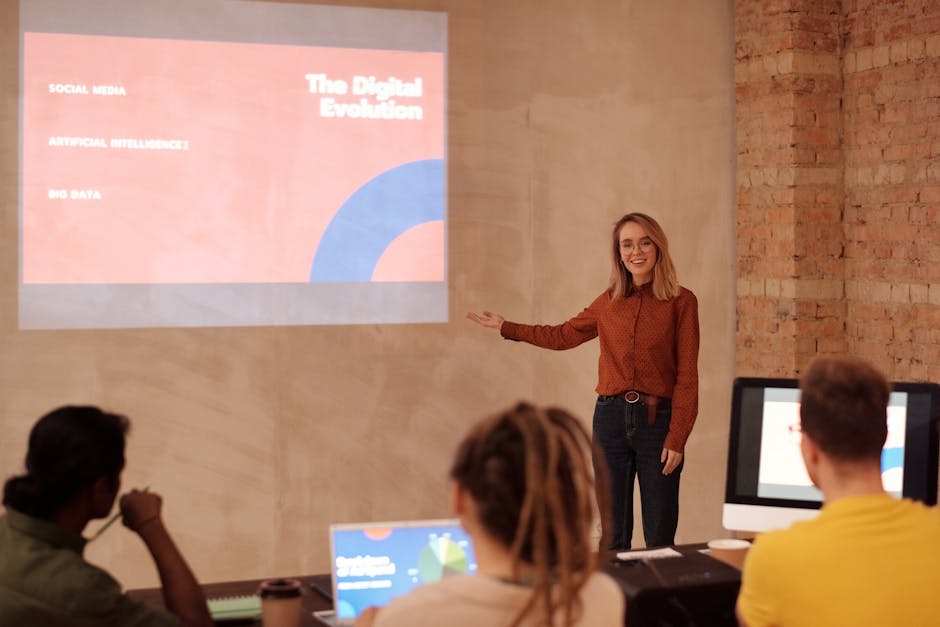Beyond the Buzzword: Demystifying Digital Transformation Consultancy

From Surviving to Thriving in the Digital Age
What is digital change consultancy? It's a specialized service that helps organizations integrate digital technologies into all business areas, fundamentally changing how they operate and deliver value.
Quick Answer:
- Definition: Strategic guidance to help organizations adopt digital technologies and change how they work.
- Purpose: Transform business operations, improve efficiency, and improve customer/donor experience.
- Key Areas: Technology integration, process optimization, cultural change, and data-driven decision-making.
- Outcome: Sustainable growth, competitive advantage, and improved organizational agility.
A McKinsey report reveals that 92% of companies don't believe their business model will remain viable through digitization, yet only 30% of companies successfully steer digital change. This isn't just about new computers; it's about reimagining how your organization operates to thrive in a digital world.
The COVID-19 pandemic accelerated this reality, forcing organizations to adapt or fail. For nonprofits, the stakes are even higher, as you compete for donor attention and the resources needed to fulfill your mission.
As Mahir Iskender, CEO of KNDR.digital, I've helped dozens of nonprofits implement AI-powered systems that boost donations and streamline operations. My experience has shown that successful change requires both strategic vision and practical execution.

Find more about what is digital change consultancy:
What is Digital Change Consultancy and Why Does it Matter?
Many nonprofits still manage donor information in spreadsheets while competitors use AI to personalize donor journeys. What is digital change consultancy? It's the strategic guidance that transforms how organizations use technology to achieve their mission. Unlike a simple software upgrade, it's about reimagining your entire approach to operations, donor engagement, and impact measurement.
Since most organizations struggle to steer digital change on their own, expert guidance is essential. A consultant helps overcome resistance, align technology with your mission, and ensure digital investments deliver results, turning strategy into a clear roadmap for growth.
Defining what is digital change consultancy
Think of a digital change consultant as a strategic partner who helps integrate technology into every aspect of your work. It's not just about IT; true digital change addresses three critical areas: people, process, and technology. A consultant helps create a cultural shift, breaking down the "we've always done it this way" mentality.
Using a data-driven perspective, they identify "activation barriers"—invisible roadblocks like fear of new systems or departmental silos. The goal isn't just to implement software but to create lasting change that improves how you serve your mission.
The Core Responsibilities of a Digital Change Consultant
A consultant's work spans the entire change journey. Key responsibilities include:
- Business Assessment: A digital health checkup of your current technology, processes, and maturity to find hidden inefficiencies.
- Strategy Development: Creating a clear digital roadmap that aligns technology choices with your specific organizational goals.
- Process Optimization: Identifying the right tools and redesigning workflows to move beyond time-consuming manual processes.
- Change Implementation: Managing the rollout, training your team, and ensuring a smooth transition.
- Performance Measurement: Establishing systems to track progress, optimize performance, and provide ongoing support.
Why Your Business or Nonprofit Needs a Guide
The complexity of integrating new technologies while managing daily operations can be overwhelming, which is why many change efforts fail. An external consultant brings invaluable objectivity and experience, having seen what works and what doesn't across many organizations.
They can steer internal politics with a neutral perspective, building consensus and keeping everyone focused on the bigger picture. For nonprofits, this is crucial for ensuring every dollar is invested effectively. A consultant's expertise builds team confidence, which increases adoption and turns a daunting initiative into a real opportunity for improvement.
The Anatomy of a Successful Digital Change
Successful digital change isn't just about new software; it's about creating harmony between technology, processes, and people. Even the most advanced fundraising platform will fail if your team can't use it or donors find it confusing. What is digital change consultancy really accomplishes is getting all these pieces working together seamlessly.
Key Focus Areas for Consultants
Consultants focus on areas that create the biggest impact:
- Customer Experience: Rethinking every touchpoint to create smooth, personalized experiences for donors and supporters, from website visits to ongoing engagement.
- Operational Processes: Analyzing how work gets done to automate manual tasks and replace inefficient, siloed systems with integrated platforms.
- Business Models: Finding better ways to deliver on your mission, such as creating new digital services or using data to move from reactive to proactive strategies.
- Modernizing Legacy Systems: Moving from outdated systems and spreadsheets to modern, cloud-based platforms that improve efficiency and open up new capabilities.
Digital Fundraising for Charities explores how these areas apply to nonprofits.
The Crucial Role of Data, Analytics, and AI
Making decisions without data is like flying blind. Smart strategy is built on a foundation of data-driven insights.
- Data-Driven Decisions: Implementing systems to track the right metrics and analyze trends, turning information into actionable insights instead of relying on guesswork.
- AI for Automation: Using smart systems to handle routine tasks, personalize communications at scale, and predict supporter behavior, such as identifying high-value donors.
- AI for Personalization: Making every supporter feel valued by delivering content custom to their interests and giving history, a task that can now be automated.
Recent AI readiness research highlights how AI empowers nonprofits by freeing up capacity. For practical steps, see How to Automate Marketing for Nonprofits.
The Human Element: Leadership, Culture, and Change Management
Technology alone is not enough; the human element is what makes or breaks any change initiative.
- Leadership Commitment: Leaders must genuinely champion the change by investing time, money, and political capital.
- Change-Ready Culture: Create a safe environment for experimentation and collaboration, breaking down departmental silos.
- Managing Resistance: Address the natural discomfort of change with clear communication about the "why" and the benefits.
- User Adoption and Training: Ensure people use new systems effectively through comprehensive training, ongoing support, and clear communication that connects daily tasks to the organization's mission.
Successful change amplifies human potential by automating what machines do best.
The Tangible Outcomes of Change

The results of what is digital change consultancy are tangible and measurable, from cutting donation processing time to doubling donor engagement. When done right, digital change transforms organizations from the inside out.
Key Benefits: Beyond Efficiency to Agility and Growth
The benefits of digital change compound over time, leading to a complete organizational change.
- Improved Operations: Organizations can achieve an 80% increase in operational efficiency. For example, one nonprofit reduced manual donation processing from 15 hours a week to just 2.
- Improved Donor Experiences: Seamless, personalized interactions create lasting relationships, driving loyalty and increased giving.
- Increased Business Agility: The ability to respond to opportunities in days, not months. Digital change can reduce service launch times by 60%, allowing nonprofits to adapt quickly.
- Sustainable Growth: Smart systems create a competitive advantage, allowing your team to focus on strategy and impact.
Digital Fundraising Strategies
Overcoming Common Change Challenges
Digital change has its problems, but an experienced consultant helps steer them.
- Resistance to Change: Addressed by involving staff and communicating how changes will make their work more meaningful.
- Lack of Clear Vision: Solved by crafting a clear roadmap that connects daily tasks to big-picture goals.
- Budget Constraints: Managed by prioritizing high-impact changes first. Automating processes can cut operational costs by up to 50%, funding future improvements.
- Data Silos & Integration: Overcome by implementing strategies to bring information together, revealing transformative insights.
Key Success Factors for Lasting Change
Certain factors consistently lead to success:
- Clear Strategy: Every technology decision must connect directly to organizational goals.
- Leadership Buy-in: Active, visible support from leadership is non-negotiable.
- Agile Mindset: The ability to adapt strategies based on real-world feedback.
- Talent & Training: Investing in training existing staff to empower them with new skills.
- Effective Governance: Regular check-ins and clear accountability to ensure changes stick.
- Focus on Measurable Outcomes: Tracking quantifiable results to justify investment and guide improvements.
Online Fundraising Optimization
A Career in Digital Change Consulting

The world of what is digital change consultancy is booming, creating incredible opportunities for professionals who want to make a real impact. Every organization struggling with outdated systems or trying to leverage AI needs skilled guides who understand both technology and strategy. It's a challenging and fulfilling field where you can see organizations transform and thrive.
Essential Skills for a Digital Change Consultant
Success in this field requires a unique blend of skills:
- Technical Expertise: Understanding cloud computing, data analytics, AI, and automation to spot opportunities.
- Business Acumen: Grasping how organizations operate to align digital strategies with business goals.
- Project Management: Coordinating complex initiatives with multiple stakeholders to stay on track and on budget.
- Communication Skills: Translating technical concepts for non-technical audiences and explaining the "why" behind the change.
- Analytical Thinking: Digging deep to identify the root causes of business challenges.
- Adaptability & Leadership: Staying current with evolving trends and guiding teams through uncertainty.
Career Paths and Salary Expectations
A career in digital change consulting offers clear growth paths. It often begins with entry-level roles like Digital Change Analyst, progressing to senior roles like Consultant or Manager, and eventually to leadership tracks like Principal Consultant or Director.
The financial rewards reflect the high demand. In Ireland, for example, digital change consultants earn an average of €60,000 per year, with higher figures in major global tech hubs. Demand spans all sectors, including Finance, Healthcare, and Retail, offering a chance to work in areas that align with your values. For those interested in the nonprofit sector, the need for this expertise is particularly acute.
Frequently Asked Questions about Digital Change Consultancy
When organizations explore what is digital change consultancy, a few key questions always come up. Here are the most common ones, with straightforward answers.
What is the difference between digital change and a simple technology upgrade?
A technology upgrade is replacing an old tool with a new one, like getting a faster car to drive the same old route. It might improve speed, but it doesn't change the destination or the process.
Digital change is a fundamental shift in how your organization operates and delivers value. It's like realizing you can work remotely instead of driving at all. It affects your strategy, culture, and processes. For example, moving donor data to the cloud is an upgrade; using that data with AI to predict giving trends is digital change.
How do I know if my organization needs what is digital change consultancy?
The signs are usually clear. You may need a consultant if:
- Your supporters are frustrated with outdated processes or impersonal communication.
- Your team is bogged down by manual data entry and inefficient workflows.
- You're losing ground to more innovative competitors or similar organizations.
- You have plenty of data but no actionable insights to guide your strategy.
- Your culture resists change, and new initiatives get stuck in bureaucracy.
If these sound familiar, you're likely ready for a more comprehensive approach than a simple software purchase.
What are the first steps to starting a digital change?
Starting can feel overwhelming, but it boils down to three key steps:
- Assess Your Current State: Take an honest look at your current technology, processes, and capabilities to identify pain points and opportunities.
- Define Your Goals: Get specific about what you want to achieve. Are you trying to increase donations, improve retention, or streamline operations? Your goals must be clear and measurable.
- Secure Leadership Commitment: Ensure your leadership team is fully on board. This means more than just budget approval; they must actively champion the change and communicate its importance.
These steps create a solid foundation for a successful change initiative driven by your mission, not just by technology trends.
Conclusion: Your Next Step on the Change Journey
We've explored what is digital change consultancy and seen that it's far more than a technology upgrade—it's a fundamental reimagining of how your organization thrives in a digital world.
The reality is clear: most companies fear their business model is obsolete, and few successfully manage digital change alone. This gap is where consultancy provides strategic guidance, technical expertise, and change management to turn complexity into measurable progress.
The benefits are tangible: improved operational efficiency, better donor experiences, increased agility, and sustainable growth. For nonprofits, this means amplifying your mission's impact. Success hinges on the human element—leadership, culture, and change management—which is where an expert consultant proves invaluable.
The path forward is to assess where you are, define your vision, and secure leadership commitment. With the right guidance, this change is not just achievable but essential.
At KNDR, we help nonprofits harness this potential. Our AI-driven systems and results-based model (promising 800+ donations in 45 days or no payment) demonstrate our confidence in strategic digital change. We've seen how the right approach amplifies a nonprofit's impact.
The question isn't whether digital change is coming; it's whether you will lead it or be left behind.



